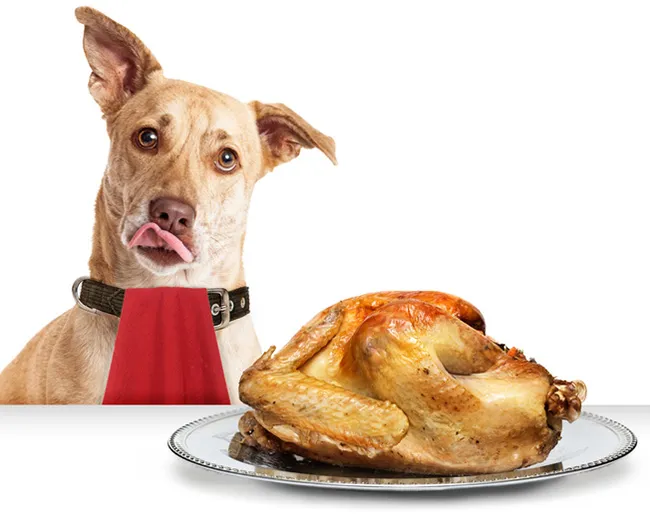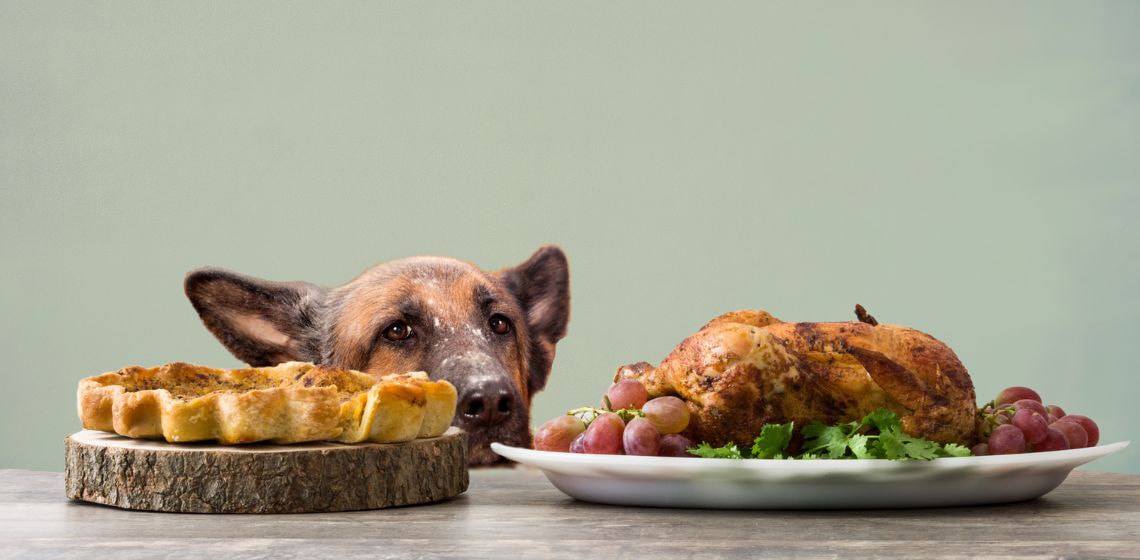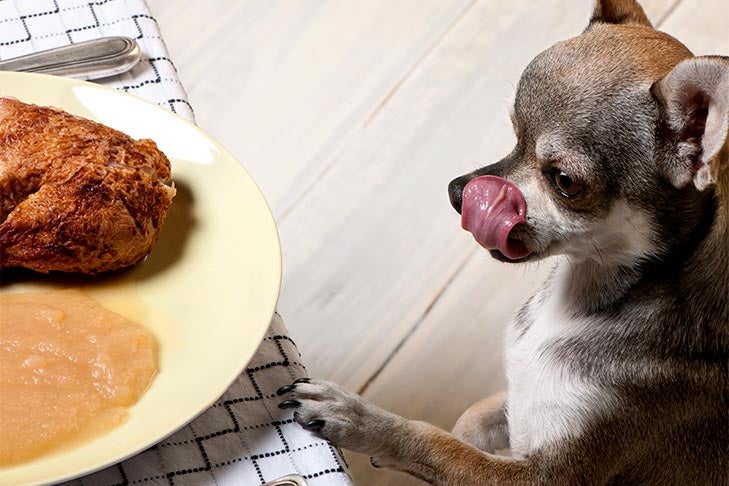Yes, dogs can eat turkey. It’s a good protein source for them.
However, there are some precautions to keep in mind. Turkey is often a staple in many households, especially during festive seasons. As you prepare your holiday meals, you might wonder if your furry friend can join in the feast. Turkey can be a healthy addition to your dog’s diet when cooked properly.
It offers essential nutrients like protein, vitamins, and minerals. But, there are some parts of the turkey that aren’t safe for dogs. Bones and seasoned skin, for example, can pose health risks. Understanding how to serve turkey safely can ensure a happy, healthy pet. Let’s explore the dos and don’ts of feeding turkey to your dog.
Turkey And Dogs
Turkey is a popular meat choice for many households. It is nutritious and flavorful. But can dogs eat turkey? This is a common question among pet owners. Turkey can be a healthy addition to a dog’s diet. But there are some considerations to keep in mind.
Benefits Of Turkey For Dogs
Turkey is rich in protein. Protein helps build strong muscles in dogs. It also supports their overall health. Turkey contains essential vitamins and minerals. These include B vitamins and selenium. They boost a dog’s immune system. Turkey is lean. Lean meats are good for dogs. They help maintain a healthy weight. Turkey is also easy to digest. This makes it a good option for sensitive stomachs.
Potential Risks Of Turkey
Not all turkey is safe for dogs. Cooked turkey is best. Raw turkey can contain harmful bacteria. These can make dogs sick. Avoid turkey bones. Bones can splinter and cause choking. Cooked bones are especially dangerous. Fatty turkey skin can lead to pancreatitis in dogs. This is a serious health issue. Seasoned turkey can be harmful. Salt, garlic, and onion are toxic to dogs. Always check for added ingredients.

Credit: www.akc.org
Healthy Turkey Preparations
Turkey can be a healthy treat for dogs. Proper preparation ensures its safety and nutritional benefits. Dogs can enjoy turkey in many forms, but it’s crucial to prepare it correctly. This section will guide you on healthy turkey preparations for your furry friend.
Cooking Methods Suitable For Dogs
Boiling turkey is a safe choice. It keeps the meat tender and removes fats. Baking is another option. Ensure the turkey is cooked thoroughly. Roasting can also work well. Avoid adding oils and spices. These methods keep turkey healthy and easy to digest.
Avoiding Harmful Ingredients
Avoid using salt and spices. These can upset your dog’s stomach. Onions and garlic are toxic for dogs. They should never be added. Stay away from butter and oils. They increase fat content, which is unhealthy for dogs. Ensure turkey is plain and cooked simply.
Portion Control
When sharing delicious turkey with your furry friend, portion control is key to ensuring their health and well-being. While turkey can be a tasty treat for dogs, it’s crucial to consider how much they should eat. Overfeeding can lead to obesity and other health issues. Keep in mind that your dog’s size, age, and activity level play a significant role in determining the right portion size. So, how much turkey is just right for your pooch?
Recommended Serving Sizes
The amount of turkey your dog can safely enjoy depends on their weight and dietary needs. A general guideline is to serve turkey as a small part of their overall diet. For small dogs, a couple of bite-sized pieces might suffice. Medium-sized dogs can have a few more pieces, while larger breeds might enjoy a little more. Always remove any skin, bones, or seasoning before serving. This ensures a safe and healthy treat.
Signs Of Overfeeding
It’s easy to get carried away with sharing treats, but how do you know if your dog has had too much? Watch for signs like weight gain, lethargy, or digestive issues. An upset stomach or changes in bowel movements can indicate overindulgence. Observe your dog’s behavior after eating turkey. Do they seem sluggish or uninterested in their usual activities? You may need to adjust their portion sizes.
Think about your own experience during holiday feasts. Have you ever felt sluggish after eating too much turkey? Your dog can feel the same way if they overeat. Moderation is crucial for both of you. Ask yourself, is this portion a treat or a meal replacement? Keeping turkey as an occasional treat ensures your dog stays healthy and happy.
By practicing portion control, you can share the joy of turkey with your pup without compromising their well-being. Remember, a little goes a long way!
Alternative Holiday Treats
Turkey can be a tasty treat for dogs in moderation. Ensure it’s cooked, plain, and free from bones. Avoid seasoning, which can upset their stomachs. Always consult a vet before introducing new foods to your dog’s diet.
When planning your holiday feast, you might wonder if your furry friend can enjoy some of the delicious treats. Turkey is often a centerpiece on the holiday table, but what about the other goodies you’re serving? Offering alternative holiday treats for your dog can ensure they’re included in the celebration without compromising their health. Let’s explore some safe and fun options for your pup.Vegetables As Safe Snacks
Many vegetables make great snacks for dogs. Carrots, for example, are crunchy and sweet, making them a favorite among many canine companions. They’re also packed with vitamins and low in calories, which is a win-win for maintaining your dog’s weight. Green beans are another excellent choice. They are low in calories and high in fiber, which can be beneficial if your dog is watching their weight. Just be sure to skip the butter and seasoning, keeping them plain and simple for your pup. You might be surprised to learn that sweet potatoes are also a safe and tasty option. They can be served cooked or dehydrated and are full of vitamins like A, B6, and C. Always serve them plain without any added sugar or spices.Homemade Dog Treat Recipes
Making homemade dog treats is a fun way to include your pet in the holiday spirit. You can control the ingredients, ensuring they’re healthy and safe for your dog. Plus, it’s a great way to get creative in the kitchen! Consider baking some simple peanut butter and pumpkin dog treats. Mix canned pumpkin, peanut butter, whole wheat flour, and eggs to form a dough. Roll it out, cut it into shapes, and bake. Your dog will love them, and you’ll have peace of mind knowing what’s in them. Another easy recipe involves mixing oats, bananas, and a bit of honey. These treats are naturally sweet and full of fiber. Simply mash the bananas, stir in the oats and honey, form little balls, and bake until golden. Have you ever tried making chicken jerky for your dog? Slice chicken breast thinly, lay the pieces on a baking sheet, and bake them slowly until they’re dry and chewy. These treats are perfect for dogs who love a good chew. What holiday treats do you think your dog would enjoy? Including them in the festivities with these safe snacks and homemade treats can make the season even more special for both of you.Understanding Dog Allergies
Understanding dog allergies is crucial for pet owners. Dogs can develop allergies just like humans. These allergies can affect their quality of life. Food allergies are common among dogs. They can cause various health issues.
Common Food Allergies In Dogs
Many dogs are allergic to certain foods. Chicken, beef, and dairy are common allergens. Wheat and soy can also cause reactions. Some dogs may react to turkey. It’s important to know these common allergens. This helps in choosing the right diet for your dog.
Symptoms To Watch For
Allergy symptoms vary in dogs. Itching and skin rashes are common signs. Some dogs may develop ear infections. Vomiting and diarrhea indicate food allergies. Sneezing and coughing can occur. Watch for changes in behavior or appetite. Always consult a vet if you suspect allergies.
Monitoring Your Dog’s Health
Monitoring your dog’s health is crucial, especially when introducing new foods like turkey to their diet. Just like humans, dogs can react differently to various foods, and turkey is no exception. By keeping a close eye on your dog’s health, you ensure that they remain happy and healthy.
Behavioral Changes After Eating
Have you ever noticed your dog acting differently after a meal? It’s not just random behavior; it could be a response to what they ate. After eating turkey, watch for any unusual signs such as lethargy, excessive licking, or changes in appetite.
These changes might indicate discomfort or a digestive issue. My friend noticed her dog refusing his favorite toy after a turkey meal, which was a clear sign that something was off. Remember, your dog’s behavior is often the first indicator of their health.
Consulting A Veterinarian
If you spot any concerning signs, don’t hesitate to reach out to a veterinarian. They can provide tailored advice based on your dog’s breed, age, and health history.
Regular check-ups are a great way to prevent any potential issues before they become serious. A vet can also guide you on appropriate portion sizes and preparation methods for turkey, ensuring your dog enjoys their meal without any adverse effects.
Would you rather play it safe than be sorry when it comes to your dog’s well-being? Consulting with a professional can make all the difference in your dog’s health journey.
Taking proactive steps, like monitoring behavioral changes and seeking veterinary advice, will help you make informed decisions about what to feed your furry friend. Your attentiveness can help prevent health issues and keep your dog in great shape.
Balancing Treats And Nutrition
Dogs can eat turkey in moderation as a tasty treat. Ensure it’s cooked well and free from spices or bones. Balancing these treats with their regular diet is important for their health.
Balancing treats and nutrition is key for your dog’s health. Turkey is a popular choice for many dog owners. It’s tasty and packed with protein. But moderation is crucial. Treats should never replace a balanced diet. They are an addition, not the main course. Let’s explore the importance of maintaining a balanced diet and supplementing with healthy foods.Maintaining A Balanced Diet
A balanced diet ensures your dog gets all necessary nutrients. Protein, fats, and carbohydrates should be in the right amounts. Turkey is a good protein source. Yet, it lacks other essential nutrients. Feed turkey in moderation. Always pair it with other food groups. Consider vegetables and grains. They provide fiber and vitamins. Remember, balance is key. Too much protein can lead to health issues. Always check with a vet. They can guide you on proper portions.Supplementing With Healthy Foods
Healthy foods can boost your dog’s diet. Fresh veggies make great additions. Carrots and peas are good choices. They are low-calorie and nutritious. Fruits can be treats too. Apples and blueberries are safe options. Always remove seeds and cores. These can be harmful. Grains like rice provide energy. They are easy to digest. Avoid processed foods. They often contain harmful additives. Always introduce new foods slowly. Watch for any allergic reactions. Your dog’s diet should be varied and balanced.
Credit: www.healthypawspetinsurance.com
Holiday Safety Tips
Dogs can eat turkey, but moderation is key. Lean, cooked turkey without skin or bones is safest. Avoid seasoned turkey to prevent stomach upset.
The holiday season is a time of joy, laughter, and delicious food. However, it’s also a time when pet owners need to be extra cautious about what their furry friends are eating. Turkey, a staple at many holiday dinners, can be both a treat and a risk for dogs if not handled properly. Being mindful of holiday safety tips can ensure your celebrations remain joyful for everyone, including your pets. ###Preventing Accidental Ingestion
Accidental ingestion is one of the most common holiday mishaps for dogs. With all the hustle and bustle, it’s easy for pets to sneak a bite of something they shouldn’t. Always keep turkey platters and leftovers out of reach. Consider placing food on higher surfaces or using baby gates to block your dog from entering the dining area. Watch out for small bones, which can be dangerous if swallowed. It’s a good idea to remind family members and guests not to feed table scraps to your pup. A quick slip of food under the table might seem harmless, but it can lead to serious health issues for your dog. ###Creating A Safe Eating Environment
Setting up a safe eating environment for your dog during the holidays can prevent accidents. Designate a specific eating area for your pet away from the main dining space. This helps to minimize the temptation of grabbing food from the table. Make sure your dog has access to their regular food and fresh water throughout the day. If you want to treat your dog to some turkey, ensure it’s plain, cooked, and bone-free. Use this opportunity to teach your dog simple commands like “stay” or “leave it” to reinforce good behavior around food. Have you ever noticed how curious dogs get around food? It’s because they rely heavily on their sense of smell. By creating a designated area for them, you help reduce their curiosity-driven misadventures. How do you plan to make your home safe for your dog this holiday season?
Credit: thevets.com
Frequently Asked Questions
Is Cooked Turkey Ok For Dogs?
Cooked turkey is safe for dogs in moderation. Remove bones and skin to avoid health issues. Seasonings, especially garlic and onions, can be harmful. Ensure the turkey is plain and cooked thoroughly. Always consult your vet before introducing new foods to your dog’s diet.
What Are The Three Toxic Meats For Dogs?
Raw pork, undercooked chicken, and processed meats like bacon are toxic for dogs. These can cause serious health issues. Avoid feeding them to your pet. Always ensure meat is properly cooked and unprocessed for your dog’s safety.
Can Turkey Upset A Dog’s Stomach?
Yes, turkey can upset a dog’s stomach. Fatty skin and seasoning cause digestive issues. Cooked bones are dangerous and can lead to blockages. Always give plain, cooked turkey in moderation to avoid problems. Consult a vet before introducing new foods to your dog’s diet.
Can Dogs Eat Turkey In Thanksgiving?
Yes, dogs can eat turkey during Thanksgiving. Ensure it’s plain, cooked, and free from bones, skin, and seasoning. Avoid adding garlic, onions, or spices. Turkey is a good source of protein for dogs. Moderation is key to prevent digestive issues.
Always consult your vet for specific dietary advice.
Conclusion
Turkey can be a tasty treat for dogs. It’s rich in protein. Always cook turkey thoroughly. Raw turkey can cause health issues. Remove bones before serving. They can splinter and hurt dogs. Watch out for added seasonings. Garlic and onions are harmful.
Keep portions small to avoid stomach upset. Turkey skin is greasy; limit intake. Consult your vet for specific dietary advice. Every dog is different. Observe your dog’s reaction to turkey. Enjoy feeding your dog safely. Keep their health a top priority.
Turkey can be a healthy part of their diet.

